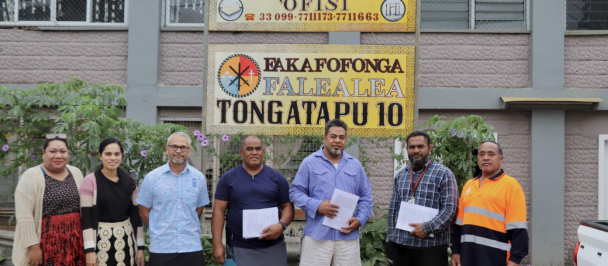The Green Climate Fund (GCF) Board has approved a US$22.66 million grant for Tonga’s Coastal Resilience Project, supplemented by US$1.2 million in co-financing from the Government of Tonga and US$63,000 from the UN Development Programme (UNDP).
This initiative aims to build the long-term resilience of vulnerable coastal communities and transformative adaptation to the direct impacts of climate change in Tonga spearheaded by the Government of Tonga’s Department of Climate Change under the Ministry of Meteorology, Energy, Information, Disaster Management, Climate Change and Communications (MEIDECC), with the support of the UNDP.
The project approval marks a significant milestone in addressing climate impacts in Tonga and it builds upon Tonga’s Joint National Adaptation Plan 2 on Climate Change and Disaster Risk Management (JNAP2) 2018-2028 and the Tonga Strategic Development Framework (TDSF) II, 2015–2025.
Key components of the project include strengthening knowledge, capacity and engagement for incorporating climate risks into long-term adaptation planning, through a multi-sectoral, multi-stakeholder engagement and dialogue platform and the development of participatory climate risk-informed plans at the village and district levels.
Additionally, the project will reinforce national and local capacities for effective monitoring and assessment of climate risks. The project will also implement coastal protection measures in vulnerable areas like Hahake to mitigate climate hazards.
UNDP Pacific Office in Fiji Resident Representative, Munkhtuya Altangerel reaffirmed the necessity of the project: “I thank the Green Climate Fund and commend the Tongan Government’s commitment to pursue solutions which integrate science, infrastructure and extensive community consultation for addressing coastal vulnerabilities. This project will define clear limitations and adaptation strategies across short, medium and long-term goals to protect communities from sea level rise and marine hazards.”
“UNDP’s efforts in Coastal Adaptation in the Pacific region have advanced understanding and brought clarity regarding the needs of long-term adaptation planning. By implementing these measures, Tonga will lead way in pragmatic science informed solutions tailored to Tonga’s unique setting and community needs,” Altangerel added.
The GCF Tonga Coastal Resilience Project focuses on immediate coastal protection measures and long-term adaptation planning to sustainably mitigate the impacts of climate change. Targeting the northeastern parts of Tongatapu, where coastal communities face significant risks from sea level rise and extreme weather events, the project aims to directly benefit 3,608 people.
Indirectly, this coastal resilience project will impact nearly the entire population of Tonga, providing the Government of Tonga with better tools and strategies for climate adaptation. In the long-run, decision-making for land use and development planning will be improved to reduce vulnerability to climate hazards, while strengthening community capacities to manage and adapt to climate risks.
Aligned with Tonga’s national priorities and contributing to global efforts to spur transformative climate solutions in most vulnerable regions, the approval of the Tonga Coastal Resilience Project underscores the commitment of the GCF and UNDP to support small island developing states in their fight against climate change.
The project’s implementation is expected to begin in 2025.
For more information, please contact: Risiate Biudole | Communications Analyst | UNDP Pacific Office in Fiji | risiate.biudole@undp.org


















